Unit 4 Don't eat in class. 核心考点讲练(共50张PPT)-2022-2023学年七年级英语下册同步精品课堂(人教版)
文档属性
| 名称 | Unit 4 Don't eat in class. 核心考点讲练(共50张PPT)-2022-2023学年七年级英语下册同步精品课堂(人教版) | 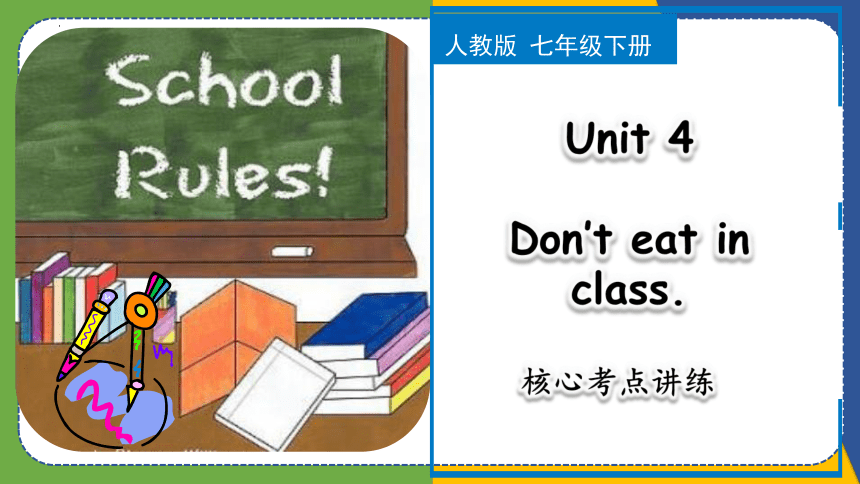 | |
| 格式 | pptx | ||
| 文件大小 | 1.6MB | ||
| 资源类型 | 教案 | ||
| 版本资源 | 人教新目标(Go for it)版 | ||
| 科目 | 英语 | ||
| 更新时间 | 2023-03-07 09:23:39 | ||
图片预览

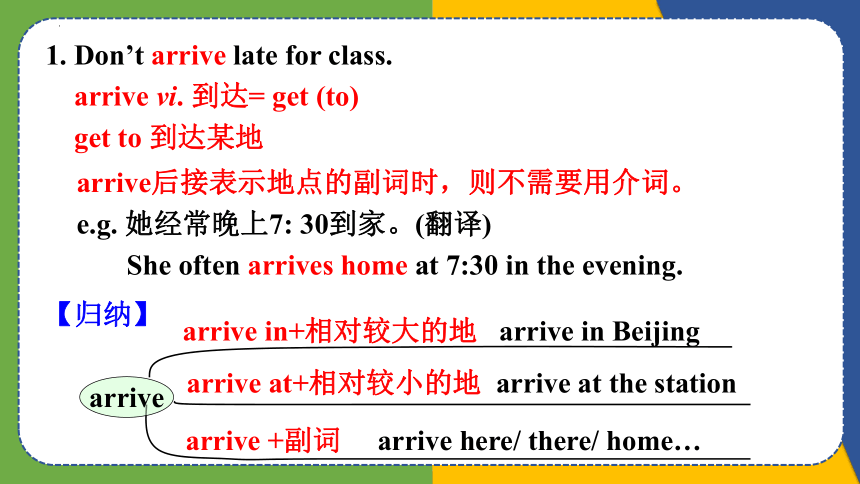
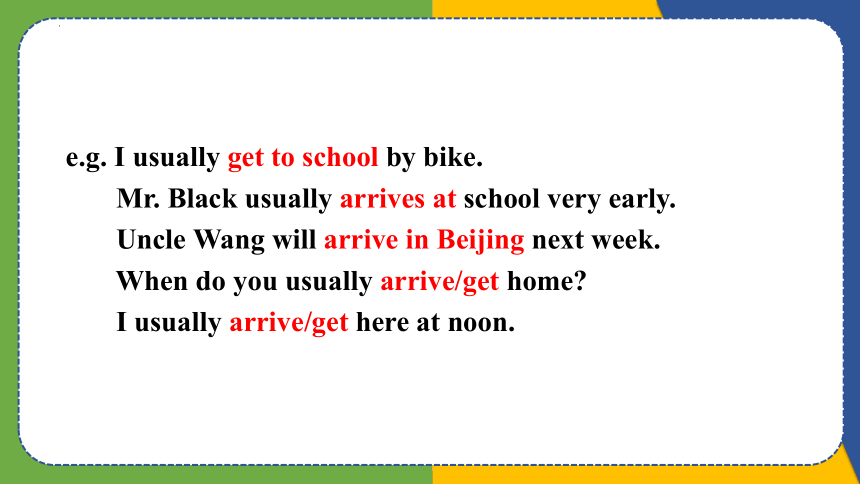
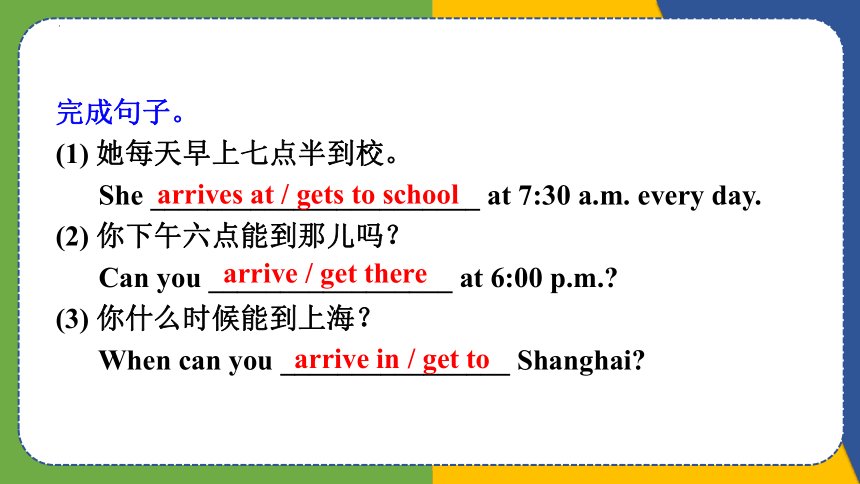
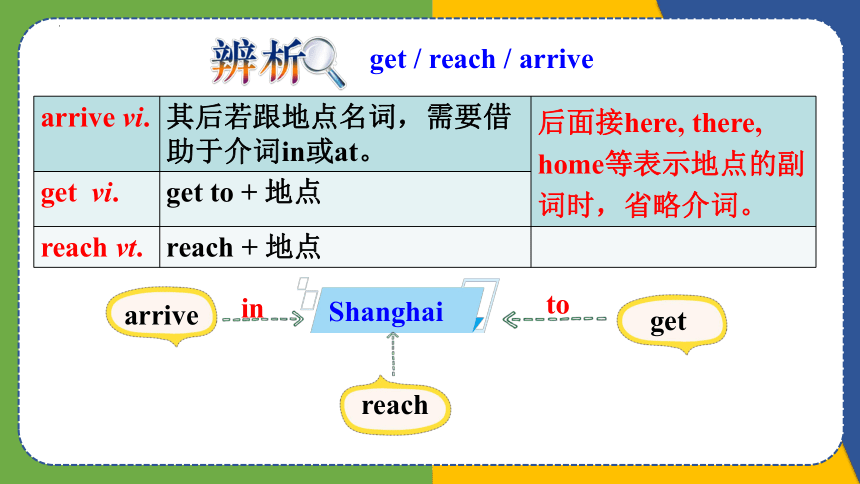
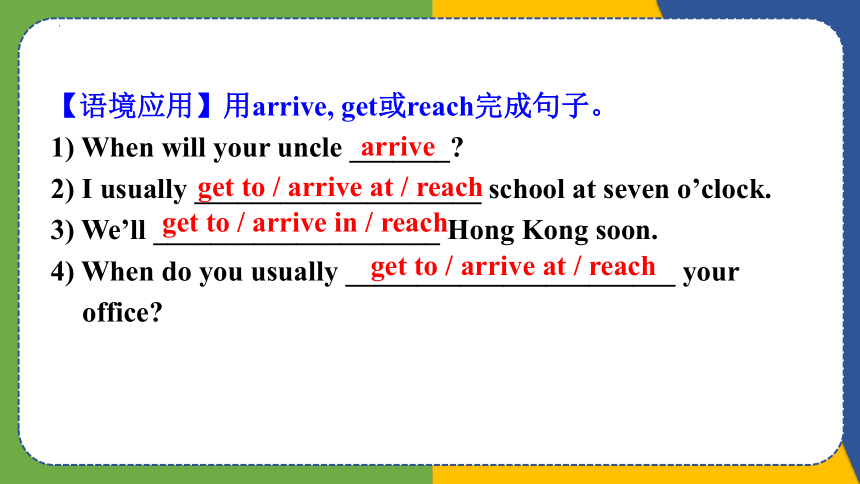

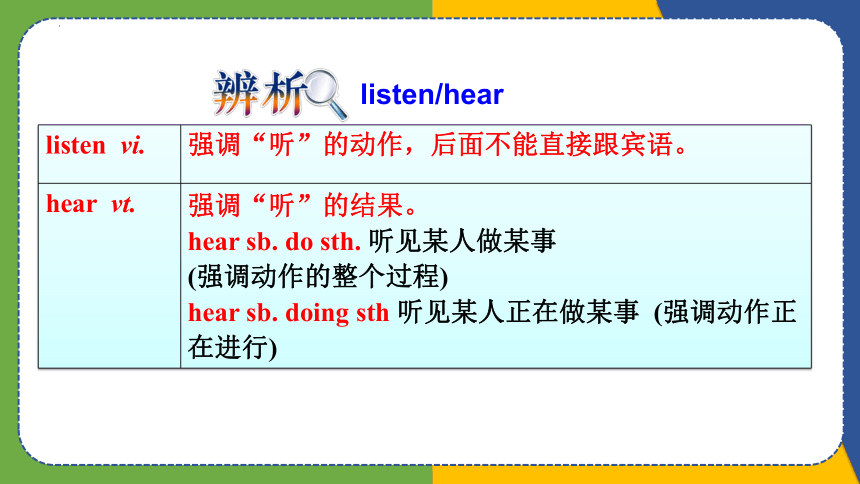

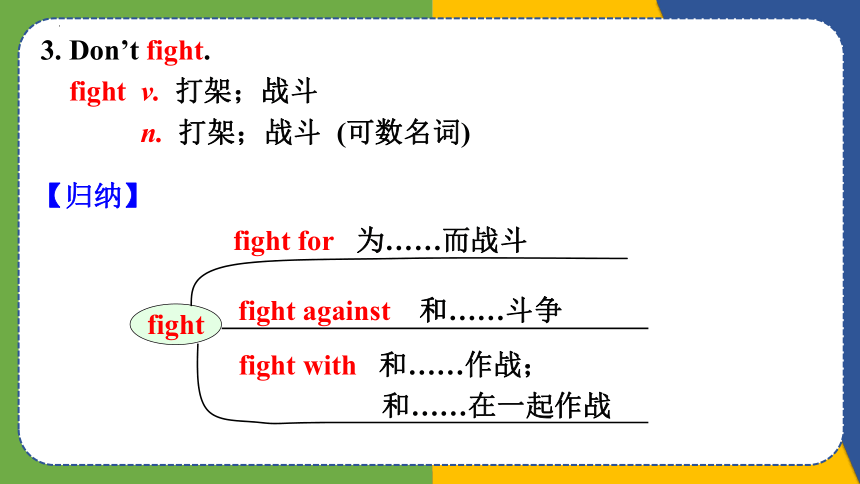

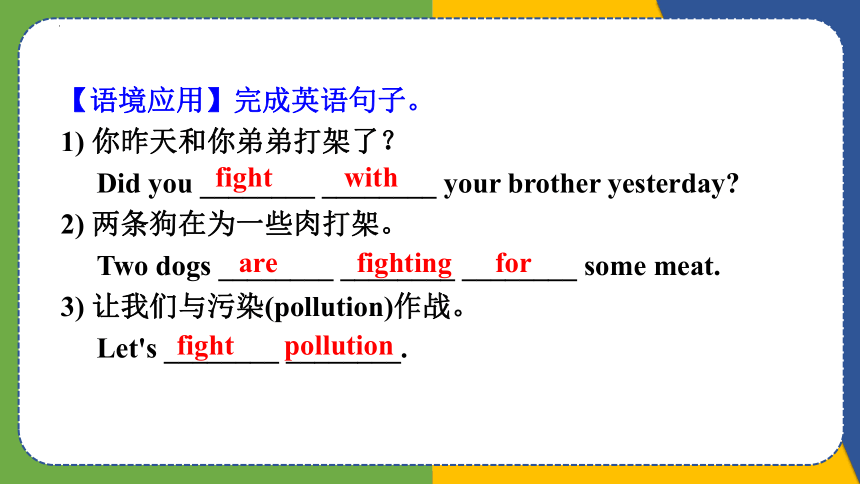
文档简介
(共50张PPT)
人教版 七年级下册
Unit 4
Don’t eat in class.
核心考点讲练
1. Don’t arrive late for class.
arrive vi. 到达= get (to)
get to 到达某地
arrive后接表示地点的副词时,则不需要用介词。
e.g. 她经常晚上7: 30到家。(翻译)
She often arrives home at 7:30 in the evening.
arrive in+相对较大的地 arrive in Beijing
arrive at+相对较小的地 arrive at the station
arrive +副词 arrive here/ there/ home…
arrive
【归纳】
e.g. I usually get to school by bike.
Mr. Black usually arrives at school very early.
Uncle Wang will arrive in Beijing next week.
When do you usually arrive/get home
I usually arrive/get here at noon.
完成句子。
(1) 她每天早上七点半到校。
She _______________________ at 7:30 a.m. every day.
(2) 你下午六点能到那儿吗?
Can you _________________ at 6:00 p.m.
(3) 你什么时候能到上海?
When can you ________________ Shanghai
arrives at / gets to school
arrive / get there
arrive in / get to
get / reach / arrive
arrive vi. 其后若跟地点名词,需要借助于介词in或at。 后面接here, there, home等表示地点的副词时,省略介词。
get vi. get to + 地点 reach vt. reach + 地点
Shanghai
arrive
reach
get
to
in
【语境应用】用arrive, get或reach完成句子。
1) When will your uncle _______
2) I usually ____________________ school at seven o’clock.
3) We’ll ____________________ Hong Kong soon.
4) When do you usually _______________________ your office
arrive
get to / arrive at / reach
get to / arrive in / reach
get to / arrive at / reach
listen v. 听;用来提醒某人注意,后不跟事物。
e.g. 听!谁在教室里唱歌?
Listen! Who’s singing in the classroom
2. Don’t ______________ in class.
不能在教室里听音乐。
listen to music
如果后面跟要听的事物,+介词to再跟事物。
e.g. 认真听老师讲。(翻译)
Listen to our teacher carefully.
listen/hear
listen vi. 强调“听”的动作,后面不能直接跟宾语。
hear vt. 强调“听”的结果。
hear sb. do sth. 听见某人做某事
(强调动作的整个过程)
hear sb. doing sth 听见某人正在做某事 (强调动作正在进行)
【语境应用】用hear或 listen完成句子。
1) ________! Who is talking in the room
2) Jerry is ________ to the teacher carefully in the classroom now.
3) I could ________ Lucy playing the guitar when I walked past her house.
4) I often ________ Miss Wu speak English.
Listen
listening
hear
hear
3. Don’t fight.
fight v. 打架;战斗
n. 打架;战斗 (可数名词)
【归纳】
fight
fight for 为……而战斗
fight with 和……作战;
和……在一起作战
fight against 和……斗争
e.g. My little brothers are always fighting.
Tom often fights with his classmates.
The children are fighting for playing soccer.
You will have to fight against difficulties.
We had a big fight last weekend.
【语境应用】完成英语句子。
1) 你昨天和你弟弟打架了?
Did you ________ ________ your brother yesterday
2) 两条狗在为一些肉打架。
Two dogs ________ ________ ________ some meat.
3) 让我们与污染(pollution)作战。
Let's ________ ________.
fight with
are fighting for
fight pollution
4. And we always have to wear the school uniform.
wear v. 穿、戴, (表示状态)
put on 穿上;戴上 (强调动作,不表示状态)
e.g. 我姑姑穿着蓝色的裙子, 白色的T恤。
My aunt wears a blue skirt and a white T-shirt.
他戴眼镜吗? (翻译)
Does he wear glasses
【拓展】
与wear相关的其他搭配:
wear glasses 戴眼镜
wear a ring 戴着戒指
wear a tie 系领带
wear one’s hair long 留着长发
wear a beard 留胡须
完成句子。
(1) Mike穿着一件棕色的夹克衫。
Mike _______ _______ _______ _______.
(2) 你为什么总是戴一顶帽子?
Why do you always _______ _______ _______
(3) 你需要穿上你的运动鞋。
You need to _______ _______ _______ _______ _______.
wears a brown jacket
wear a hat
put on your sports shoes
5. Can we bring music players to school
bring v. 带来;取来
e.g. Can you bring your brother here
你能把你的弟弟带到这儿来吗?
bring / take / get / carry
bring (从别处向说话者或被提到的人所在的地方)带来;拿来
take (从说话者或被提到的人所在的地方向别处)带走;拿走
carry “搬运;提;扛”,不强调方向
get “取回;拿回”,表示去某地把某物拿回来,表示的是一个双向的动作。
e.g. Take that small box away and bring me a big one. If it is too heavy for you to carry, I'll send Joe to get it.
【运用】完成句子
(1) 你可以把你的朋友们带到派对来。
You can _______ _______ _______ _______ the party.
(2) 请帮我把我的书包拿到教室去。
Please help me _______ _______ _________ _______ the classroom.
bring your friends to
take my schoolbag to
【语境应用】用bring/take/get/carry完成句子。
1) Please go into the room and ________ me my raincoat. It’s raining outside.
2) Look! The robot is ________ those heavy things.
3) If you go to Shanghai, please ________ some clothes to my daughter.
4) Remember to ________ your dictionary here tomorrow.
get
carrying
take
bring
6. can & must & have to
can表许可、可以,否定can’t表禁止,不行。
must表示说话人的主观看法,必须,否定mustn’t,不准;禁止。
have to表必须时与must意义接近,有时可互换;
have to更侧重于客观需要。可用在不同时态中,有人称和数的变化,一般现在时的否定形式为don’t / doesn’t have to,不必。
【语境应用】完成句子。
1) 你今晚不可以看电视。
You ___________________ this evening.
2) 我们必须按时到达机场。
We __________________________ the airport on time.
3) 你早晨不必起那么早。
You ___________________ so early in the morning.
can’t watch TV
must/have to arrive at/get to
don’t have to get up
祈使句一般用来表示请求、命令、劝说、号召、警告等。
祈使句中, 通常省略第二人称主语you。
肯定式以动词原形开头,否定式一般在动词原形前加don’t。
祈使句
e.g. Come and join us.
Read after me.
Don’t be late.
Don’t talk in class!
Don’t let the children swim in the river.
一、祈使句的肯定式
1. 以行为动词原形开头,简称Do型。
e.g. Come here. 到这儿来。
2. 以动词be开头,简称Be型。
e.g. Be quiet, please. 请安静。
3. 以Let开头,简称Let型。
e.g. Let’s go! 咱们走吧!
注意:
有时可在祈使句的句首或句尾加上please,使语气显得客气、有礼貌。如果在句尾加please,应该用逗号与前句隔开。
e.g. Go this way, please. 请这边走。
二、祈使句的否定式
1. Do型和Be型的否定式是在句首加don’t。
e.g. Don’t sit here. 不要坐在这儿。
Don’t be late. 别迟到。
2. 以let开头的祈使句,其否定式有两种:
直接在句首加don’t
let +宾语+not +动词原形+ (其他)
e.g. Don’t let him go. 不要让他走。
Let’s not go there. 咱们别去那儿。
注意:
“No+名词/动词 ing形式”表示禁止或规劝,常用于公共场所。
e.g. No photos! 禁止拍照!
No smoking! 禁止吸烟!
【语境应用】翻译句子。
1) 快点走。
Walk quickly.
2) 别让他们说话。
Don’t let them talk. / Let them not talk.
3) 安静点!
Be quiet!
4) 不要在这儿吃东西。
Don’t eat here.
can 可以,表示请求、允许。
I can dance and sing.
can还可表示能力, 能,会。
-- Can the students run in the hallways
-- Yes, they can./No, they can’t.
We can’t eat in the classroom.
can
情态动词can
肯定句:
主语+can+动词原形+其他.
否定句:
主语+can not/can’t+动词原形+其他.
疑问句:
Can+主语+动词原形+其他
肯定回答:Yes, 主语+can.
否定回答:No, 主语+can’t.
情态动词can的句型结构:
must 必须;一定
表示主观需要或责任感的驱使有必要或有义务去做某事,没有人称和时态的变化,后接动词原形。
句型结构:主语+must+动词原形+其他
情态动词must
e.g. You must come in time.
你必须按时来。
The children must be back before 6 o’clock.
孩子们必须6点前回来。
have to 必须;不得不
表示因客观的需要不得不做某事,有人称和时态的变化,后接动词原形。
其否定式don’t / doesn’t have to表示“不必;没必要”。
否定形式和疑问句形式均需要借助助动词do才可以进行变化。
情态动词have to
e.g. I have to leave school because my family is poor.
We don’t have to go to school on Sundays.
She has to look after her mother at home.
--Does he have to go to bed now
--Yes, he does./ No, he doesn’t.
_________ the guitar 练习吉他
practice v. 练习。后可跟名词、代词或动词-ing形式。
e.g. 我每天早晨必须练习英语。
I must practice English every morning.
我们在练习说英语。(翻译)
We are practicing speaking English.
practice
1. Dear Dr. Know
Dr.为doctor(博士;医生;医师)一词的缩写形式,放于姓氏之前,表示对人的尊称。Dr.采用的是首尾缩写法,取首字母和词尾字母将单词进行缩写。
2. Get up now and make your bed
make the bed/make one’s bed 整理床铺
e.g. 你会整理床铺吗?
Can you ______________
鲍勃总是自己整理床铺。
Bob always _______________.
make your bed
makes his bed
3. After dinner, I can’t relax either.
either adv. 也,于否定句句末,用法与表示肯定或陈述的副词too相似,可用逗号与语句的主题隔开。
e.g. 我不会打篮球, 我妹妹也不会。
I can’t play basketball. My sister can’t (play it), either.
你喜欢英语,我也喜欢。(翻译)
You like English. I like it, too.
also, too & either 也
also和too只能用于肯定句或疑问句中,
also常位于句中,too常位于句末;
either只用于否定句中,常位于句末。
e.g. I can’t swim and my sister can’t, either.
Tracy is also a friend of mine.
I know the answer, too.
【语境应用】用also, too, either完成句子。
I can’t play the piano and my brother can’t ________.
2) Judy is in the Art Club. Lucy is ________ in the club.
3) Liu Ting enjoys strawberries and she likes lemons ________.
4) We went to Beijing on holiday. Did you go there ________
either
also
too
too
4. But I have to go be bed before 10:00.
before在……之前; after在……之后。
后面可以跟表示时间的点,也可以跟一个从句表示时间。
e.g. 饭前洗手。
Wash your hands before dinner.
放学后做作业。 (翻译)
Do your homework after school.
翻译句子。
1) 吴太太到家之后一般先为家人做饭。
Mrs. Wu usually makes dinner for the family first after she gets home.
2) 睡觉前刷牙。
Brush your teeth before you go to bed.
5. Parents and schools are sometimes strict, …
strict adj. 严格的;严厉的
be strict with sb. 对某人要求严厉
be strict in / about sth. 对某事要求严格
e.g. Our math teacher is very strict.
我们的数学老师很严格。
Are your parents strict with you
你的父母对你严格吗?
The girl is very strict in doing the work.
这个女孩对工作要求严格。
strict
1) 根据下列句子及所给的首字母, 在答题纸上按题号写出各单词的正确、完全形式 (每空限填一词) 。(2020浙江杭州)
My parents are very s______ with me. I am not allowed to hang out with friends even on weekends.
strict
2) 根据所给汉语句子,把英语句子补充完整(每空填一个单词)。(2019山东烟台)
我们历史老师中等身高。他对我们很严格。
Our history teacher is of medium height. He is very _______ with us.
strict
【语境应用】完成句子。
1) 赵先生是一位严格的经理吗?
Is Mr Zhao ______________________
2) 我们的数学老师非常严厉。
Our maths teacher _____________________.
3) 李婷的父母对她要求严格。
Li Ting’s parents ______________________.
4) Miss Miller is strict _______ her students and also strict ________ her work.
Miller小姐对她的学生很严厉,她对她的工作也很严格。
a strict manager
is very strict
are strict with her
with
in
6. …, but remember, they make rules to help us.
remember v. 记住;记起
remember
remember to do sth.
记住要干某事
remember + that从句
记住……;记得……
remember doing sth.
记得曾经做过某事
e.g. I remembered reading this novel, but I didn't remember to return it to the library.
【拓展】
forget to do sth. 忘记去做某事
forget doing sth. 忘记做过某事
stop to do sth. 停下来去做某事
stop doing sth. 停下正在做的某事
regret to do sth. 做某事很遗憾
regret doing sth. 后悔做过某事
【语境应用】
— John, remember _______ off (关) the lights when you leave the classroom.
— No problem! (2019湖南湘西)
A. turn B. turned C. to turn
C
完成句子。
(1) 我记不住你的电话号码。
I can’t _______________________________________.
(2) 记住明天把你们的作业带到这儿来。
_____________________ your homework here tomorrow.
(3) 我记得在图书馆见过她。
I _____________________ in the library.
remember your telephone / phone number
Remember to bring
remember seeing her
7. There are a lot of things you can do.
有许多你可以做的事情。
a lot of things you can do是一个名词短语, you can do起修饰, 限定名词things的作用。当句子限定修饰名词时要放在该名词之后。
e.g. There are a lot of songs you can sing. (翻译)
有许多歌曲你可以唱。
8. I have to keep my hair short.
keep vt. 保持;保留
“keep +宾语+宾语补足语” 使……保持某种状态
e.g. 我们必须每天保持教室干净。
We must keep our classroom clean every day.
你是怎样保持水果新鲜的? (翻译)
How can you keep the fruit fresh
9. I must learn to play the piano.
learn v. 学习;学会
1) learn + 事物
e.g. 吴老师周末帮我学习英语。 (翻译)
Ms. Wu helps me to learn English on weekend.
2) learn to do sth. 学习做某事
e.g. 我们下课后学习下棋吧。 (翻译)
Let’s learn to play chess after class.
3) learn from ... 向……学习
完成句子。
(1) 你必须学会游泳。
You must ___________________.
(2) 我们不得不向Helen学习。
We have to ____________________.
learn to swim
learn from Helen
人教版 七年级下册
Unit 4
Don’t eat in class.
核心考点讲练
1. Don’t arrive late for class.
arrive vi. 到达= get (to)
get to 到达某地
arrive后接表示地点的副词时,则不需要用介词。
e.g. 她经常晚上7: 30到家。(翻译)
She often arrives home at 7:30 in the evening.
arrive in+相对较大的地 arrive in Beijing
arrive at+相对较小的地 arrive at the station
arrive +副词 arrive here/ there/ home…
arrive
【归纳】
e.g. I usually get to school by bike.
Mr. Black usually arrives at school very early.
Uncle Wang will arrive in Beijing next week.
When do you usually arrive/get home
I usually arrive/get here at noon.
完成句子。
(1) 她每天早上七点半到校。
She _______________________ at 7:30 a.m. every day.
(2) 你下午六点能到那儿吗?
Can you _________________ at 6:00 p.m.
(3) 你什么时候能到上海?
When can you ________________ Shanghai
arrives at / gets to school
arrive / get there
arrive in / get to
get / reach / arrive
arrive vi. 其后若跟地点名词,需要借助于介词in或at。 后面接here, there, home等表示地点的副词时,省略介词。
get vi. get to + 地点 reach vt. reach + 地点
Shanghai
arrive
reach
get
to
in
【语境应用】用arrive, get或reach完成句子。
1) When will your uncle _______
2) I usually ____________________ school at seven o’clock.
3) We’ll ____________________ Hong Kong soon.
4) When do you usually _______________________ your office
arrive
get to / arrive at / reach
get to / arrive in / reach
get to / arrive at / reach
listen v. 听;用来提醒某人注意,后不跟事物。
e.g. 听!谁在教室里唱歌?
Listen! Who’s singing in the classroom
2. Don’t ______________ in class.
不能在教室里听音乐。
listen to music
如果后面跟要听的事物,+介词to再跟事物。
e.g. 认真听老师讲。(翻译)
Listen to our teacher carefully.
listen/hear
listen vi. 强调“听”的动作,后面不能直接跟宾语。
hear vt. 强调“听”的结果。
hear sb. do sth. 听见某人做某事
(强调动作的整个过程)
hear sb. doing sth 听见某人正在做某事 (强调动作正在进行)
【语境应用】用hear或 listen完成句子。
1) ________! Who is talking in the room
2) Jerry is ________ to the teacher carefully in the classroom now.
3) I could ________ Lucy playing the guitar when I walked past her house.
4) I often ________ Miss Wu speak English.
Listen
listening
hear
hear
3. Don’t fight.
fight v. 打架;战斗
n. 打架;战斗 (可数名词)
【归纳】
fight
fight for 为……而战斗
fight with 和……作战;
和……在一起作战
fight against 和……斗争
e.g. My little brothers are always fighting.
Tom often fights with his classmates.
The children are fighting for playing soccer.
You will have to fight against difficulties.
We had a big fight last weekend.
【语境应用】完成英语句子。
1) 你昨天和你弟弟打架了?
Did you ________ ________ your brother yesterday
2) 两条狗在为一些肉打架。
Two dogs ________ ________ ________ some meat.
3) 让我们与污染(pollution)作战。
Let's ________ ________.
fight with
are fighting for
fight pollution
4. And we always have to wear the school uniform.
wear v. 穿、戴, (表示状态)
put on 穿上;戴上 (强调动作,不表示状态)
e.g. 我姑姑穿着蓝色的裙子, 白色的T恤。
My aunt wears a blue skirt and a white T-shirt.
他戴眼镜吗? (翻译)
Does he wear glasses
【拓展】
与wear相关的其他搭配:
wear glasses 戴眼镜
wear a ring 戴着戒指
wear a tie 系领带
wear one’s hair long 留着长发
wear a beard 留胡须
完成句子。
(1) Mike穿着一件棕色的夹克衫。
Mike _______ _______ _______ _______.
(2) 你为什么总是戴一顶帽子?
Why do you always _______ _______ _______
(3) 你需要穿上你的运动鞋。
You need to _______ _______ _______ _______ _______.
wears a brown jacket
wear a hat
put on your sports shoes
5. Can we bring music players to school
bring v. 带来;取来
e.g. Can you bring your brother here
你能把你的弟弟带到这儿来吗?
bring / take / get / carry
bring (从别处向说话者或被提到的人所在的地方)带来;拿来
take (从说话者或被提到的人所在的地方向别处)带走;拿走
carry “搬运;提;扛”,不强调方向
get “取回;拿回”,表示去某地把某物拿回来,表示的是一个双向的动作。
e.g. Take that small box away and bring me a big one. If it is too heavy for you to carry, I'll send Joe to get it.
【运用】完成句子
(1) 你可以把你的朋友们带到派对来。
You can _______ _______ _______ _______ the party.
(2) 请帮我把我的书包拿到教室去。
Please help me _______ _______ _________ _______ the classroom.
bring your friends to
take my schoolbag to
【语境应用】用bring/take/get/carry完成句子。
1) Please go into the room and ________ me my raincoat. It’s raining outside.
2) Look! The robot is ________ those heavy things.
3) If you go to Shanghai, please ________ some clothes to my daughter.
4) Remember to ________ your dictionary here tomorrow.
get
carrying
take
bring
6. can & must & have to
can表许可、可以,否定can’t表禁止,不行。
must表示说话人的主观看法,必须,否定mustn’t,不准;禁止。
have to表必须时与must意义接近,有时可互换;
have to更侧重于客观需要。可用在不同时态中,有人称和数的变化,一般现在时的否定形式为don’t / doesn’t have to,不必。
【语境应用】完成句子。
1) 你今晚不可以看电视。
You ___________________ this evening.
2) 我们必须按时到达机场。
We __________________________ the airport on time.
3) 你早晨不必起那么早。
You ___________________ so early in the morning.
can’t watch TV
must/have to arrive at/get to
don’t have to get up
祈使句一般用来表示请求、命令、劝说、号召、警告等。
祈使句中, 通常省略第二人称主语you。
肯定式以动词原形开头,否定式一般在动词原形前加don’t。
祈使句
e.g. Come and join us.
Read after me.
Don’t be late.
Don’t talk in class!
Don’t let the children swim in the river.
一、祈使句的肯定式
1. 以行为动词原形开头,简称Do型。
e.g. Come here. 到这儿来。
2. 以动词be开头,简称Be型。
e.g. Be quiet, please. 请安静。
3. 以Let开头,简称Let型。
e.g. Let’s go! 咱们走吧!
注意:
有时可在祈使句的句首或句尾加上please,使语气显得客气、有礼貌。如果在句尾加please,应该用逗号与前句隔开。
e.g. Go this way, please. 请这边走。
二、祈使句的否定式
1. Do型和Be型的否定式是在句首加don’t。
e.g. Don’t sit here. 不要坐在这儿。
Don’t be late. 别迟到。
2. 以let开头的祈使句,其否定式有两种:
直接在句首加don’t
let +宾语+not +动词原形+ (其他)
e.g. Don’t let him go. 不要让他走。
Let’s not go there. 咱们别去那儿。
注意:
“No+名词/动词 ing形式”表示禁止或规劝,常用于公共场所。
e.g. No photos! 禁止拍照!
No smoking! 禁止吸烟!
【语境应用】翻译句子。
1) 快点走。
Walk quickly.
2) 别让他们说话。
Don’t let them talk. / Let them not talk.
3) 安静点!
Be quiet!
4) 不要在这儿吃东西。
Don’t eat here.
can 可以,表示请求、允许。
I can dance and sing.
can还可表示能力, 能,会。
-- Can the students run in the hallways
-- Yes, they can./No, they can’t.
We can’t eat in the classroom.
can
情态动词can
肯定句:
主语+can+动词原形+其他.
否定句:
主语+can not/can’t+动词原形+其他.
疑问句:
Can+主语+动词原形+其他
肯定回答:Yes, 主语+can.
否定回答:No, 主语+can’t.
情态动词can的句型结构:
must 必须;一定
表示主观需要或责任感的驱使有必要或有义务去做某事,没有人称和时态的变化,后接动词原形。
句型结构:主语+must+动词原形+其他
情态动词must
e.g. You must come in time.
你必须按时来。
The children must be back before 6 o’clock.
孩子们必须6点前回来。
have to 必须;不得不
表示因客观的需要不得不做某事,有人称和时态的变化,后接动词原形。
其否定式don’t / doesn’t have to表示“不必;没必要”。
否定形式和疑问句形式均需要借助助动词do才可以进行变化。
情态动词have to
e.g. I have to leave school because my family is poor.
We don’t have to go to school on Sundays.
She has to look after her mother at home.
--Does he have to go to bed now
--Yes, he does./ No, he doesn’t.
_________ the guitar 练习吉他
practice v. 练习。后可跟名词、代词或动词-ing形式。
e.g. 我每天早晨必须练习英语。
I must practice English every morning.
我们在练习说英语。(翻译)
We are practicing speaking English.
practice
1. Dear Dr. Know
Dr.为doctor(博士;医生;医师)一词的缩写形式,放于姓氏之前,表示对人的尊称。Dr.采用的是首尾缩写法,取首字母和词尾字母将单词进行缩写。
2. Get up now and make your bed
make the bed/make one’s bed 整理床铺
e.g. 你会整理床铺吗?
Can you ______________
鲍勃总是自己整理床铺。
Bob always _______________.
make your bed
makes his bed
3. After dinner, I can’t relax either.
either adv. 也,于否定句句末,用法与表示肯定或陈述的副词too相似,可用逗号与语句的主题隔开。
e.g. 我不会打篮球, 我妹妹也不会。
I can’t play basketball. My sister can’t (play it), either.
你喜欢英语,我也喜欢。(翻译)
You like English. I like it, too.
also, too & either 也
also和too只能用于肯定句或疑问句中,
also常位于句中,too常位于句末;
either只用于否定句中,常位于句末。
e.g. I can’t swim and my sister can’t, either.
Tracy is also a friend of mine.
I know the answer, too.
【语境应用】用also, too, either完成句子。
I can’t play the piano and my brother can’t ________.
2) Judy is in the Art Club. Lucy is ________ in the club.
3) Liu Ting enjoys strawberries and she likes lemons ________.
4) We went to Beijing on holiday. Did you go there ________
either
also
too
too
4. But I have to go be bed before 10:00.
before在……之前; after在……之后。
后面可以跟表示时间的点,也可以跟一个从句表示时间。
e.g. 饭前洗手。
Wash your hands before dinner.
放学后做作业。 (翻译)
Do your homework after school.
翻译句子。
1) 吴太太到家之后一般先为家人做饭。
Mrs. Wu usually makes dinner for the family first after she gets home.
2) 睡觉前刷牙。
Brush your teeth before you go to bed.
5. Parents and schools are sometimes strict, …
strict adj. 严格的;严厉的
be strict with sb. 对某人要求严厉
be strict in / about sth. 对某事要求严格
e.g. Our math teacher is very strict.
我们的数学老师很严格。
Are your parents strict with you
你的父母对你严格吗?
The girl is very strict in doing the work.
这个女孩对工作要求严格。
strict
1) 根据下列句子及所给的首字母, 在答题纸上按题号写出各单词的正确、完全形式 (每空限填一词) 。(2020浙江杭州)
My parents are very s______ with me. I am not allowed to hang out with friends even on weekends.
strict
2) 根据所给汉语句子,把英语句子补充完整(每空填一个单词)。(2019山东烟台)
我们历史老师中等身高。他对我们很严格。
Our history teacher is of medium height. He is very _______ with us.
strict
【语境应用】完成句子。
1) 赵先生是一位严格的经理吗?
Is Mr Zhao ______________________
2) 我们的数学老师非常严厉。
Our maths teacher _____________________.
3) 李婷的父母对她要求严格。
Li Ting’s parents ______________________.
4) Miss Miller is strict _______ her students and also strict ________ her work.
Miller小姐对她的学生很严厉,她对她的工作也很严格。
a strict manager
is very strict
are strict with her
with
in
6. …, but remember, they make rules to help us.
remember v. 记住;记起
remember
remember to do sth.
记住要干某事
remember + that从句
记住……;记得……
remember doing sth.
记得曾经做过某事
e.g. I remembered reading this novel, but I didn't remember to return it to the library.
【拓展】
forget to do sth. 忘记去做某事
forget doing sth. 忘记做过某事
stop to do sth. 停下来去做某事
stop doing sth. 停下正在做的某事
regret to do sth. 做某事很遗憾
regret doing sth. 后悔做过某事
【语境应用】
— John, remember _______ off (关) the lights when you leave the classroom.
— No problem! (2019湖南湘西)
A. turn B. turned C. to turn
C
完成句子。
(1) 我记不住你的电话号码。
I can’t _______________________________________.
(2) 记住明天把你们的作业带到这儿来。
_____________________ your homework here tomorrow.
(3) 我记得在图书馆见过她。
I _____________________ in the library.
remember your telephone / phone number
Remember to bring
remember seeing her
7. There are a lot of things you can do.
有许多你可以做的事情。
a lot of things you can do是一个名词短语, you can do起修饰, 限定名词things的作用。当句子限定修饰名词时要放在该名词之后。
e.g. There are a lot of songs you can sing. (翻译)
有许多歌曲你可以唱。
8. I have to keep my hair short.
keep vt. 保持;保留
“keep +宾语+宾语补足语” 使……保持某种状态
e.g. 我们必须每天保持教室干净。
We must keep our classroom clean every day.
你是怎样保持水果新鲜的? (翻译)
How can you keep the fruit fresh
9. I must learn to play the piano.
learn v. 学习;学会
1) learn + 事物
e.g. 吴老师周末帮我学习英语。 (翻译)
Ms. Wu helps me to learn English on weekend.
2) learn to do sth. 学习做某事
e.g. 我们下课后学习下棋吧。 (翻译)
Let’s learn to play chess after class.
3) learn from ... 向……学习
完成句子。
(1) 你必须学会游泳。
You must ___________________.
(2) 我们不得不向Helen学习。
We have to ____________________.
learn to swim
learn from Helen
同课章节目录
- Unit 1 Can you play the guitar?
- Section A
- Section B
- Unit 2 What time do you go to school?
- Section A
- Section B
- Unit 3 How do you get to school?
- Section A
- Section B
- Unit 4 Don't eat in class.
- Section A
- Section B
- Unit 5 Why do you like pandas?
- Section A
- Section B
- Unit 6 I'm watching TV.
- Section A
- Section B
- Review of Units 1-6
- Unit 7 It's raining!
- Section A
- Section B
- Unit 8 Is there a post office near here?
- Section A
- Section B
- Unit 9 What does he look like?
- Section A
- Section B
- Unit 10 I'd like some noodles.
- Section A
- Section B
- Unit 11 How was your school trip?
- Section A
- Section B
- Unit 12 What did you do last weekend?
- Section A
- Section B
